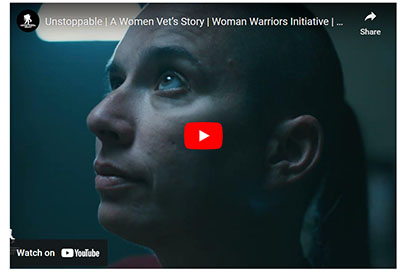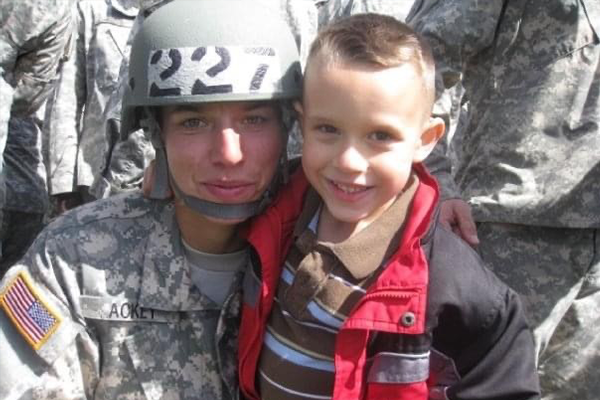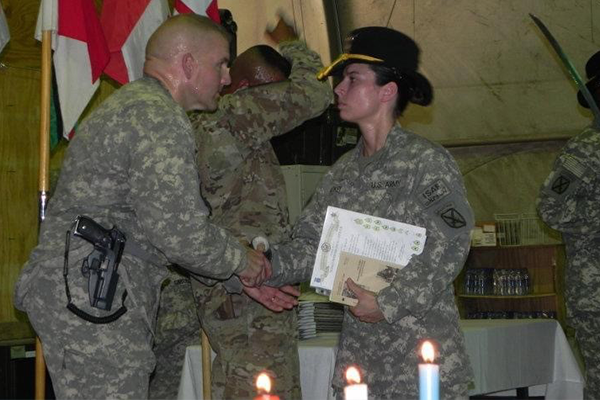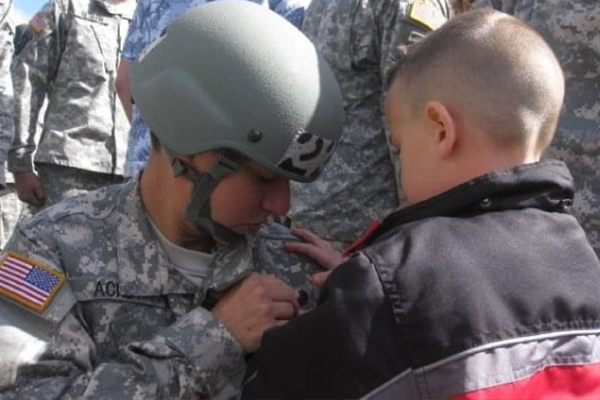Beyond the Uniform: Beth King, Army Veteran and Woman Warrior
With a 5-year-old son, Beth King knew what she was risking if she enlisted in the military, but that’s exactly why she went into the service – for the sake of her son and country.
“I watched the news as the second plane hit,” said Beth, a retired Army veteran. “I thought to myself; this is just five hours south of me. 9/11 definitely played a role in me enlisting. How could it not?”
With memories of the attacks eight years earlier still weighing on her and the need to support her son, Beth joined the Army in 2009 as a CH-47 Helicopter (Chinook) Repairer. She had hopes of becoming the first female sergeant major in her field. That goal was cut short, but she gained a second chance at life instead.
For Family and Country
Born into a military family, Beth was one of five siblings and an identical twin. Her father spent 22 years in the Navy and was gone most of the time, but she recalls always having what she needed. From a young age, she learned about pride, patriotism, and sacrifice, not realizing that later in her life, all of those would come into play with the birth of her son.
Without a college degree, Beth struggled to make ends meet and find a job that could provide for her and her newborn. During a moment of despair, a lightbulb went off.
“I was looking at how my dad raised five of us on a military salary,” Beth shared. “I thought to myself, ‘that is something worth looking into.’”
Not only did Beth need to support her son, but she believed in the military mission. Because of her father, she always stood up for what she believed in and, most importantly, defended what she valued. At the age of 30, Beth decided to enlist in the Army and leave her son for the first time. It was a risk she was willing to take for family and country.
Listen to Beth King's story on the Blindsided podcast
Pushing the Standards
Beth was older than most in basic training, which she believes played to her advantage because she was mature enough to know what she wanted to do and how to get there. She was in a male-dominated field and had a big goal in mind. There was no room to cut corners.
“Women in the military are often met with the misconception that they are incapable or need more help because of their gender,” Beth said. “And just for that reason, I worked very hard to get my physical strength to a point where I was equal with the men alongside me. I didn’t want to ask someone for help picking something up or loading anything. I was motivated to prove that I was equal, regardless of my gender.”
Her work ethic got her noticed, and immediately upon arriving at her duty station in Fort Drum, New York, she was selected for air assault school. Beth was one of three women in her brigade to graduate. She quickly transitioned up to the Chinook flight company and became the first female in her unit to complete training. In 2010, Beth deployed to Afghanistan for her first — and only — tour.
Alive Day
Beth was a part of Fort Drum’s General Support Aviation Battalion (GSAB) unit, which had been pre-positioning for an air assault all week. The crew helped move supplies and people faster and safer than traveling by ground. The route called for traveling through a valley that only had one way in and one way out.
The date was July 25, 2011. The unit decided to fly higher to avoid incoming fire, and, as they were getting ready to land, a rocket-propelled grenade (RPG) came through the belly of the aircraft and into the gator engine, which ignited the gas lines. Because of the weaponry and ammunition on board the aircraft, it immediately caught fire.
“Everything went up in flames,” Beth explained. “We were close to landing, so I started walking up the ramp to try and get out of the firing. In all the shakiness from the pilots trying to get it on the ground, I got knocked out the back of the aircraft. And so, for the last 150 or 100 feet, I dangled by my backstrap out the back of the Chinook until we landed.”
The back strap attaches to the back of the flight vest, so soldiers stay hooked to the aircraft and, in this case, don’t fall to the ground. The aircraft landed hard on its left side, with all systems going off inside because of the burned wires. Beth climbed back into the aircraft to disconnect her strap and escape. Luckily, they landed just outside the forward operating base (FOB). All 13 passengers on board, plus the crew, walked away from the incident, but not without injuries.
“With the way that fire burned, I should have had more damage to my body,” Beth said. “I had a lot of internal injuries, but I’m not sure how we all made it out. Coming home was hard, but I know that there had to have been a bigger purpose.”
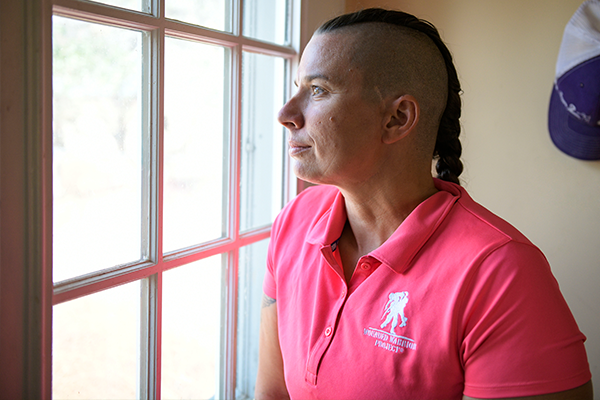
Lasting Wounds
Beth was just four feet from where the RPG penetrated her aircraft. Her jaw shook so violently that it shredded the joint meniscus within. This led to a bilateral joint replacement with titanium plates on both sides because of the severe damage done to her face. Plus, the incredibly rough landing she encountered during the incident caused permanent spinal and back injuries.
However, the wound that impacts Beth’s life the most is the traumatic brain injury (TBI) she manages daily. TBI usually results from a violent blow or jolt to the head or body, but most don’t realize they have this injury until it shows up physically. It's an invisible wound that will progress and worsen with time if left untreated, severely damaging the neurological system.
“I had things happening to my body that I didn’t understand,” Beth shared. “It started with just headaches, constant headaches, all the time, and confusion. Then, I would use the wrong words, stammer, and stutter. That’s when I realized something was wrong. I was deteriorating inside.”
It took about 18 months for Beth to receive any treatment for her TBI. She believes the delay in treatment was partly because TBI and its effects weren’t as understood as they are today. Unfortunately, she knew something was wrong and asked for help, but at the time, the situation in Afghanistan was worsening, and they needed all the bodies they could get.
“We were low on crews,” Beth explained. “They were on missions and running out of ammunition and water. That was our main job over there, moving strategic pieces around. It was mission-driven work, so if you looked like you could work, you worked.”
Within four days of the incident, Beth was on her next mission. Her condition worsened, and Beth developed drop foot while experiencing major weakness on her right side, causing her to fall often. All of that, plus her severe neurological issues, caused Beth to medically retire in 2014 as a staff sergeant. Now, Beth is losing complete feeling in both legs and using a wheelchair, but that hasn’t stopped her.
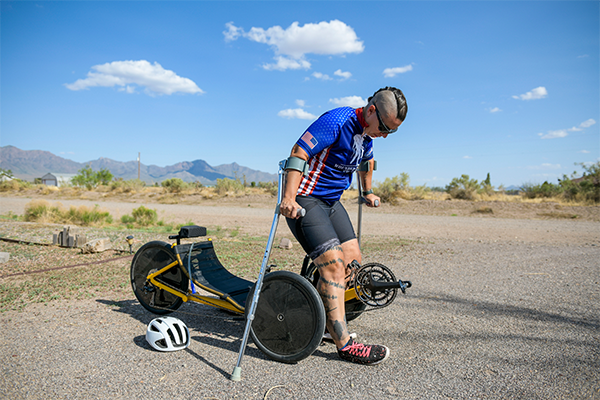
Cycling Through Life
Every year on her birthday, Beth would receive a call from Wounded Warrior Project® (WWP), but a feeling of unworthiness and fear of leaving home kept her from getting involved with any of the programs WWP offered.
“I had a lot of feelings that I wasn’t deserving of WWP programs,” Beth said. “I didn’t validate my injuries at that point, and I just felt like there were so many other people who had it so much worse than I did. I was afraid to take up space.”
In May 2018, Beth put those thoughts aside, and with support from a fellow wounded warrior, she signed up for her first Soldier Ride event. Through adaptive sports, Beth found healing, connection, and purpose. For the first time since being medically retired, she felt free again. Beth was no longer sitting on the sidelines watching life pass her by; she was getting back into the game, one pedal at a time.
“I am not just playing sports,” Beth said. “I am bettering myself physically, emotionally, and spiritually. Adaptive sports gave me a community of people who understand that the struggle is real. It gave me a place where I was able to be honest about the struggle and have people who motivate me to keep going despite that struggle.”
What’s next? In 2022, Beth traveled to The Hague, Netherlands, and competed in the Invictus Games, winning two silver medals in cycling and one bronze medal in rowing for Team USA. She’s working hard to qualify for the 2024 Paralympics, competing in javelin throw.
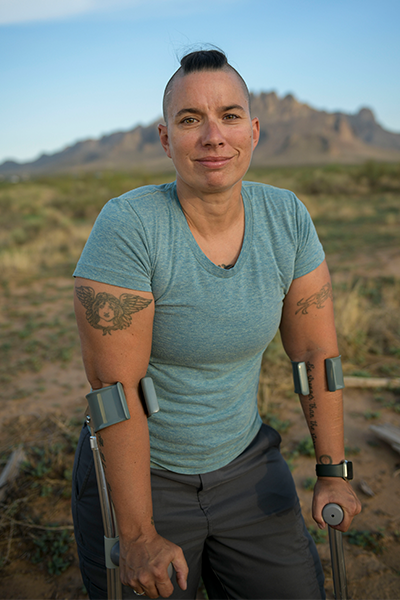
Bigger Purpose
While serving in Afghanistan had its challenges, Beth explains that it is not as complicated as returning home. As a veteran, Beth often feels invisible, and she believes it’s partly because of her gender.
“It’s not a pretty picture to look at,” Beth said. “These are our daughters, sisters, aunts, and mothers. No one wants to think about us being in harm’s way like that. It’s hard enough to think about it when they’re males. But for me, I think it surprised people who didn’t realize women are in combat. Most think we have office jobs or are nurses, but they don’t realize we serve on the front lines, too.”
In sharing her story, Beth hopes to bring awareness to the veteran female population, which continues to grow. Like all veterans, she deserves respect and recognition for her service and sacrifice. Moreover, she strongly advocates for adaptive sports and early TBI treatment because perhaps her recovery would have been a much smoother journey.
“There is hope,” Beth shares. “There is help, and there are people who care. You and your injuries are valid, and you need to take up space to receive the help you deserve. Put yourself out there because there will be people there to support you.”
WWP research found that women warriors experience certain challenges at higher rates than their male counterparts to this day. In particular, the challenge of not being seen as a veteran is still being felt by women veterans across the country. To better understand these issues and advocate for women veterans, who make up about 10% of the overall veteran population, WWP introduced the Women Warriors Initiative. To learn more on how you can #EmpowerWomenVets, click here.
Contact: — Krissty Andaur - Public Relations, kandaur@woundedwarriorproject.org, 904.760.6957
About Wounded Warrior Project
Since 2003, Wounded Warrior Project® (WWP) has been meeting the growing needs of warriors, their families, and caregivers — helping them achieve their highest ambition. Learn more.
